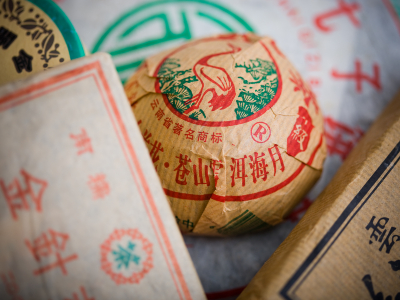POST-FERMENTED TEA: FROM PUER TO TIBETAN TEAS
4 x 2.5 hour live webinars.
Please read carefully the list of equipment you will need in order to take this course (see below)
This course contributes one credit toward the Level Three Tea Diploma qualification but is open to all, regardless of previous experience or study with the UK Tea Academy. For more details about the Tea Diploma qualification, please see this page or email info@ukteaacademy.com
LIVE WEBINARS
£tbc
Four live webinars with Chinese tea expert Juyan Webster. Includes a selection of Dark Teas and contributes one credit towards the Level 3 Tea Diploma.
International Postage £30
Restrictions apply, please click the ‘Non-UK’ button at the side of this page for more info
‘Thank you so much for this Masterclass. It was joyful and passionately given by Juyan Webster so we were happy to dive into the world of post-fermented tea. The courses were well structured and very well documented. We can highly recommend this Masterclass.’- Martine, Tea Social Club
‘A highly enjoyable and fascinating exploration of a lesser-known category of tea, including some aged and rare examples, learning from a teacher with exceptional depth of knowledge.’
WHAT WILL I LEARN?
Amongst the six tea categories in China, post-fermented tea, also known as “hei cha” or “dark tea” is the only one that involves microbial fermentation in the manufacturing process and is often aged for many years, like fine wine, developing complex flavours and aromas over time.
Dark tea has a long and rich history, spanning thousands of years. Historically it was only popular for ethnic groups at the borders. Today, post-fermented teas have gained popularity not only for their unique flavours but also for their perceived potential health properties. The best known varieties like Puer Teas are made with the large-leaf varietal from Yunnan. Other examples are: Fu Tea, known as “Mongolian diet tea”, Tibetan teas which are served with yak butter, and Liu Dao.
This is a complex category involving irregular manufacturing practices, dramatic differences in raw materials, vast regional variations, complexities of ageing and sourcing etc. However, this is a most special tea category and one that is loved by many. The quest for fine and well-made post-fermented teas is an both an adventure and a rewarding educational experience.
We will discuss the origin of dark tea, the different producing regions, the cultivars (wild tea trees or cultivated tea bushes), the different shapes the teas are pressed into, the main mountains and most renowned factories. We will create tasting notes for each tea, building on your tasting and descriptive skills as you discover the world of dark tea.
This course is a chance to take a deep dive into a fascinating tea category and learn from a Chinese tea expert. This material is not covered in Juyan’s Chinese Tea Masterclass.
The carefully selected teas include: Puer Tea, Hunan Fu Zhuan, Liu Bao Cha, Sichuan Bian Cha and Hubei Qing Zhuan Cha. The teas are included in your course price and will be mailed to you before the course begins. These teas are extremely difficult to source and many can only be accessed through this course.
COURSE BREAKDOWN
Webinar / Module 1 & 2: Puer Tea
- The history of Dark Tea
- How Dark tea was invented
- The three main producing regions of Puer teas – the six Great Tea Mountains and the six famous mountains now
- The manufacture of Puer Tea
- The difference between Raw Puer and Cooked Puer
- Microbial change from Raw Puer to Cooked Puer
- What is “Wo Dui”
- How to store Puer Tea
- How to choose and judge a Puer Tea
- Tasting 3 Cooked Puer with different regions and age (3 years old, 8 years old and 22 years old)
- Tasting 3 Raw Puer to compare the age and terroir.
Webinar / Module 3 & 4: Other Dark Teas which you might never have heard of before
- Including Hunan Fu Zhuan, Liu Bao Cha, Sichuan Bian Cha, Hubei Qing Zhuan Cha
- How are they made
- How the tea is compressed to various shapes
- How the tea is packed
- How to brew dark tea – traditional Gong Fu Tea style
- Tasting notes of teas from different regions, different age, different cultivars
- Introducing different brewing methods by different people
- How to age and storage, what is the ideal storage environment
- Judging the quality and ageing
- Dark tea and health
- Tasting 2 Tibetan Teas and 3 Anhua Dark Teas.
WHAT WILL I NEED?
In order to take this course, you will need to have some tea brewing equipment:
* A Gaiwan (ideal) or a 150ml – 200ml glass or porcelain teapot
* A Tasting cup
* A small jug (cha hai, or fairness jug) for emptying tea liquor from Gaiwan or teapot
* A big bowl for holding discarded water
* A thermometer or temperature controlled kettle
* Kettle and filtered water
Teas will be sent to you but please ensure you have the above items. If you need our help in sourcing a Gaiwan or any other equipment, you can let us know through our booking form or by email to info@ukteaacademy.com.
ABOUT THE TUTOR
Juyan Webster is the owner and founder of the The Chinese Tea Company in London. Growing up in Zhejiang Province, which is one of the most important provinces of China in tea production, Juyan was surrounded by tea and tea culture. Her family grew tea on their land where, as a child, she worked alongside her mother, picking and processing tea. It was this upbringing that shaped a passion for tea and her vast knowledge of tea production.
FURTHER TRAINING
If you wish to continue studying for your Tea Diploma, you will need to take further courses at this level and you must have already completed both Level One and Level Two before the final qualification can be awarded.


